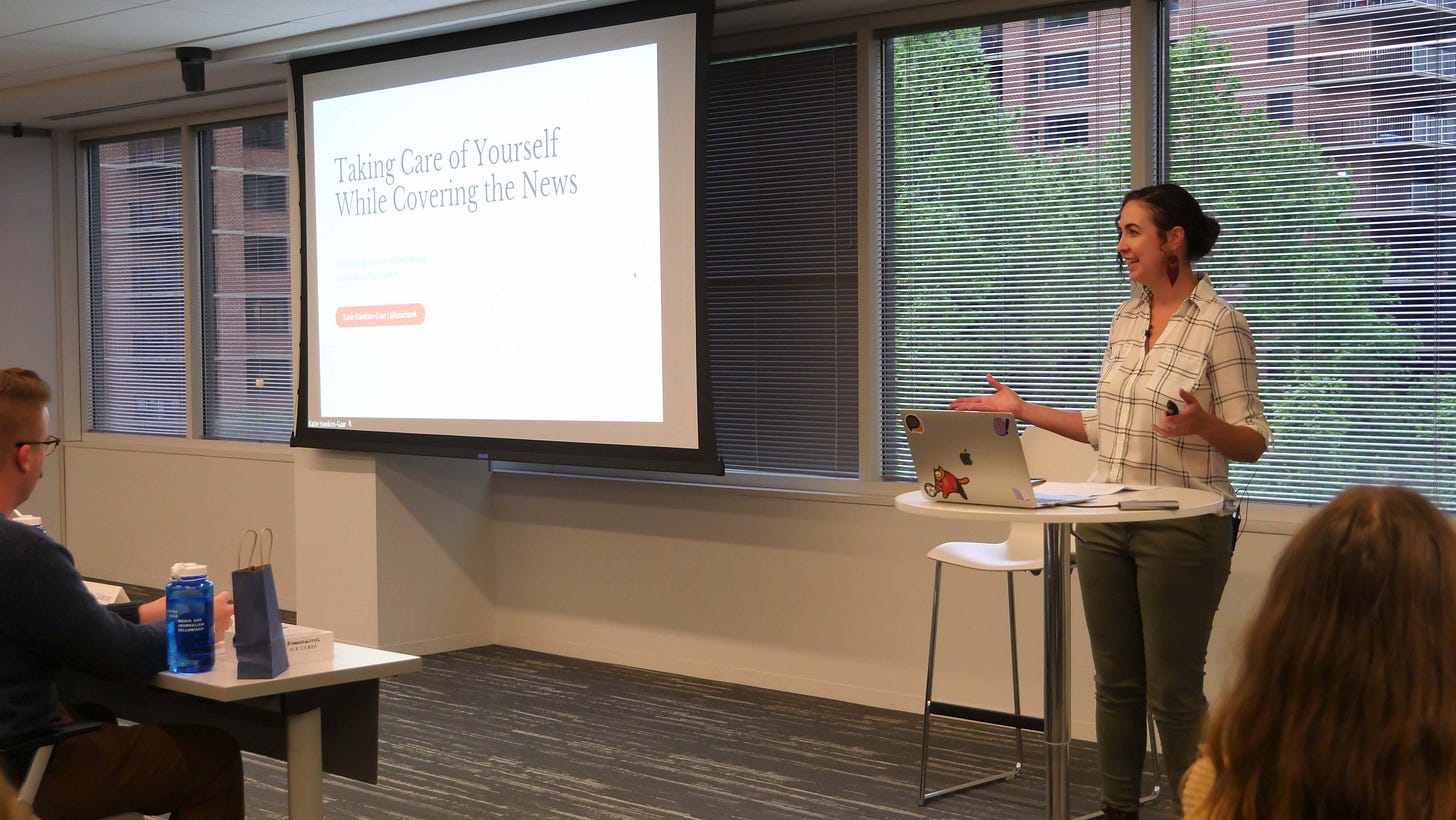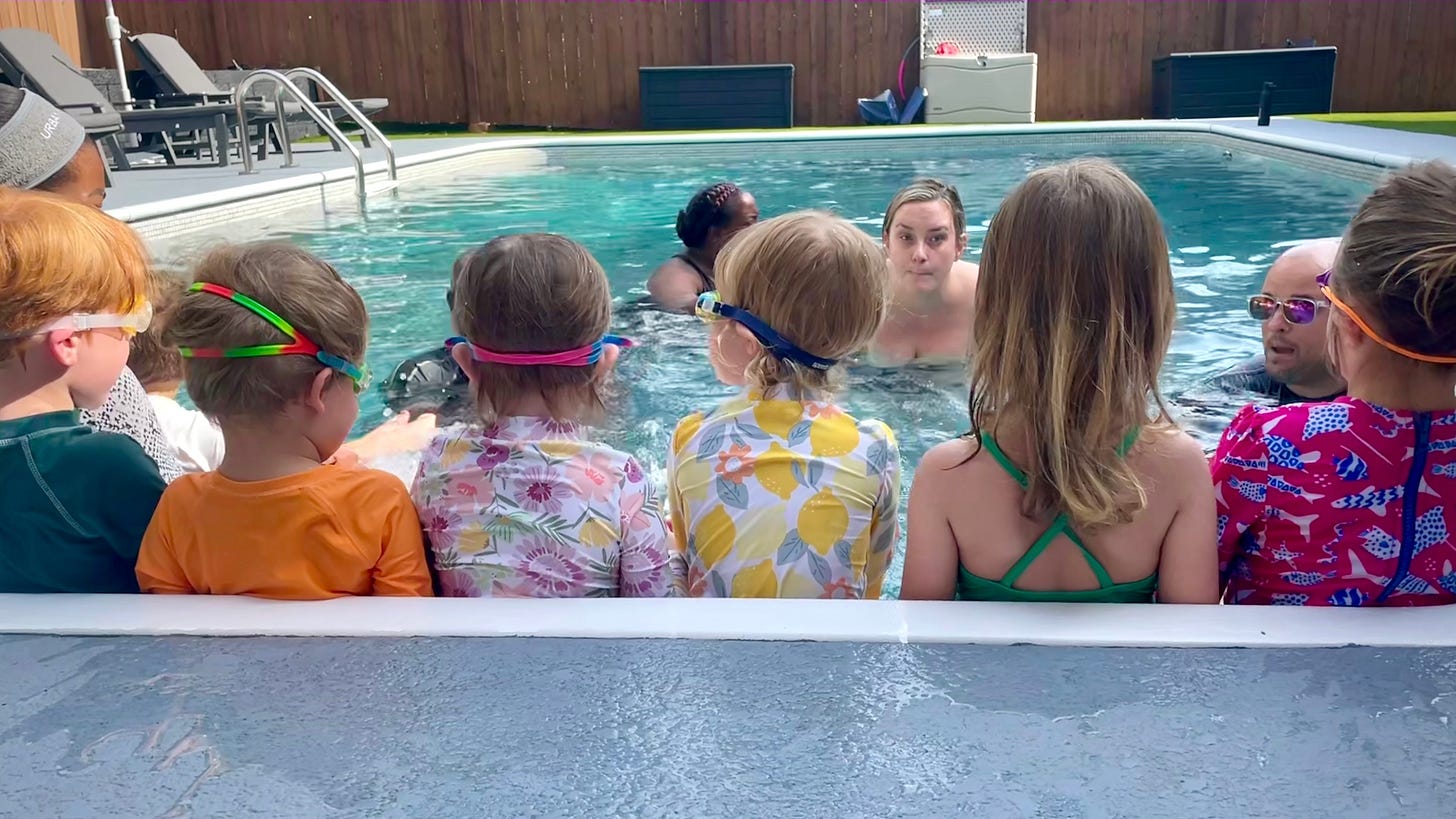How to swim, how to fly, how to operate in the world
We never stop learning.
Yesterday afternoon, my daughter completed her first swim lesson. She was excited, then nervous, then a mix of the two. She refused to blow bubbles, kicked like a champ, and left the pool a few times to sit her dripping-wet bottom in my dry lap. Through it all, Billy and I cheered her on. We were all grins and thumbs up — proudly and nervously watching from the sidelines as our little girl learned something new.
At two-and-a-half years old, my daughter encounters firsts on a near-daily basis. Sometimes she approaches those firsts tentatively, clinging tight to me as we enter a new, crowded space; sometimes she meets them head on, launching her little body directly into an inflatable bounce house as if she’s bounced in thousands before. No matter what first she’s facing, cheering her on as she navigates the world feels like the most natural thing. She’s nothing but potential and promise — an open book, waiting to be written.
A week ago, I traveled to Washington D.C., where I spent a few days with young journalists whom I’d been advising virtually for months. The entire trip, though full of things I’d done many times before, felt like one of firsts: it was my first work trip — and first flight — in more than three years; my first in-person presentation, also in more than three years; my first time traveling for work since becoming a mom; the first time since early 2020 that I’d taken an Uber, stayed in a hotel on someone else’s dime, and chit-chatted my way through conference cocktail hours and dinners.
Once I stepped into the bustling airport, finalized my presentation slides, and began chatting with fellow journalists, I fell into the familiar rhythm of traveling for work. Still, it felt new to me. It was different. I had to stifle the urge to tell everyone — someone! — how momentous all these normal-seeming things really were.
Just like my two-year-old, I was learning a new skill: how to travel, network, and operate in the world like the professional person I used to be, but to do those things now as a mom, and as someone, like all of us, who’s lived through a pandemic. Unlike my daughter, though, there was no one standing by with a big smile and open arms, cheering me on.
I had to navigate my surroundings as if I knew what I was doing: as if I was a regular business traveler, headed on another routine work trip. Nothing to see here, folks.
A couple weeks ago, our family of three went to a wedding in Florida. It was yet another flurry of firsts: Our daughter’s first time at a wedding (“What a wedding, Mama?”) and our first time keeping a toddler quiet during the ceremony (“The two people standing up front will kiss each other, then we all get to clap!”). After the kissing and clapping, we made our way to the reception, where we were seated at the same table as some never-before-met relatives of Billy’s — an older mother and her grown son, distant cousins through marriage.
Our table for six had one open seat. “I bet that’s where my mom would have sat,” Billy whispered to me, lamenting that she couldn’t take time off from work. As we talked to our tablemates, though, it became clear who they imagined that seat belonged to. The woman spoke fondly of her husband, who had died two years prior. Her son proudly chimed in, happy to tell us about his dad.
The evening included all the typical hallmarks of a wedding reception: small-talk amongst guests, toasts from the wedding party, a buffet dinner, the first dance, cake-cutting, and sending off the newlyweds. It wasn’t until the dance floor started up — when my family members left the table to twirl and jump with abandon — that I leaned over and told my table partner that I was a widow, too.
“Oh,” she said, then let out a big sigh. Her shoulders relaxed as she began sharing everything she was feeling. This was her first wedding without her husband. She wasn’t sure if she could get through the ceremony and reception, but she knew she had to try. She wasn’t prepared for how hard it would be. She hoped her husband would be proud of her.
I told her she was doing a great job. I shared how hard attending my first wedding as a widow had been for me. I reminded her that it was okay to feel sad, even during a happy event. I reassured and encouraged her, as best I could.
Tears filled her eyes as we spoke. A small, relaxed smile formed, too.
I thought I’d prepared myself for what it would be like to travel again for work, to speak in front of a crowd, to burn through my tank of introvert energy more quickly than usual. You’ve done this all before! I reminded myself. It’s just like riding a bike.
As I entered the training room ahead of my presentation, though, I realized how truly new it all felt. The last time I stood in front of a group of journalists, in January 2020, I was 34 years old. Now, I’m newly 38 and the gulf between me and the 20-somethings in the room felt wider and more intimidating than ever. What if I messed up? What if I forgot how to juggle toggling through slides while keeping track of time and also making sure I was connecting with the folks in the room? What if I seemed totally out of touch?
It occurred to me, just as I began to speak, that I could share with the group that I was new to this. That, yes, I’ve given many presentations before, but this one was my first in a really long time. Everyone in the room, waiting for my talk, was there to learn. I was there to learn, too.
The presentation went well, thanks in part to my admission of being a beginner. The hour of speaking whizzed by and there were plenty of great questions afterwards. As I headed back to my seat, I breathed a giant sigh of relief.
The highlight of the conference — for me and, it seemed, most everyone in the room — was watching fellows share their innovation projects: initiatives to better their newsroom, their community, or the journalism industry as a whole. No doubt facing their own public-speaking fears, the journalists presented their ideas to offer translated articles, more empathetic homicide coverage, mutual aid for laid-off colleagues, and so on. Their projects were thoughtful and inspiring. By Thursday night, when the top projects were given awards, I found myself in tears, cheering for a cohort of journalists who had all the potential and promise in the world.
On my flight home, I felt much more relaxed than I did when I headed to D.C. Instead of preparing presentation slides and thinking about all the tasks ahead of me, I settled into my seat with a book, thinking about how I couldn’t wait to hug my family.
The book I was reading — Mary Laura Philpott’s memoir, Bomb Shelter — couldn’t have been more apt for the moment. In one essay, she writes about approaching life as if she’s always learning. She recalled how, after witnessing her children get fresh starts with each new school grade they entered, she started to think of each year in her life as a brand new grade, too.
“Childhood is full of beginnings. Every fall when we’re young, we get to start over in a new grade, as if our lives are getting a routine software upgrade,” Philpott wrote. “New notebooks, new erasers, different lunch table, different person. Without that automatic opportunity to reintroduce ourselves to the world, adults get a chance at a reboot only if we manufacture it.”
But why should new beginnings and opportunities to learn be reserved for the very young? Each fall, Philpott now approaches her life as she’s entering a new grade. In her fortieth grade, she learned to set her alarm 10 minutes earlier to make mornings run more smoothly. In forty-first grade, she remodeled her office. As a forty-second grader, she made herself a reading list to broaden her view of the world.
“It’s goofy, I guess, to think of myself as a still-growing child,” Philpott wrote, “but it’s also thrilling to remember that although it has been my job for so many years to help my children grow up, I am still growing up, too. I am becoming someone, still and always.”
We are all learning, always. How to swim, how to fly, how to operate in the world without a spouse or parent by our side. How to be a professional, how to be an adult, how to admit that we don’t actually know what we’re doing. We are all open books, with pages still waiting to be written.
Yesterday’s swim class was designed so the parents were minimally involved. We served a role as cheerleaders and sources of comfort, but our main job was to step aside and let the swim instructors do their job. It took some effort to step back and trust that everything would work out. As our children were learning to swim, we parents were learning to observe our little ones begin to master something new—yet another skill on the path to independence.
One day, those toddlers will become adults. They might eventually become bright young journalists, ready to change the world with their moxie and bright ideas. They might become the person in front of the room, hoping to inspire the next generation, or at least feeling really lucky to be there. Or they might one day be a special guest at a wedding, reflecting on their own long marriage and good fortune in life.
They can become anything. But they will never stop learning.
xoxo KHG






Like the two comments below, I'm moving through my senior years growing in leaps and bounds, feeling such gratitude for my opportunities. In my 67th class I've finally begun teaching yoga which is something I've dreamed about doing for years, in my 66th class I began a Substack publication, and in my 65th class I published my first book. I agree with Kate, learning and growing keeps life worth living. 💜
This hit home for me this morning.
As a woman who had newly turned 70 and broke her femur resulting in a new hip replacement, I am learning a lot of “new’s”. New moves on my yoga mat. I may not move like I did before, but now I find myself doing slower yoga and holding the poses longer. New hiking in the woods with an old friend and re-newing that childhood friendship. I never was a hiker before.
I remember fondly now my dad’s words many years ago when my brothers and I were new teens; “You kids will grow up before I ever will!” And damn if we didn’t! He passed at 92. He never lost his curiosity, his sense of humor and fondness to tell new jokes.
Thank you for sharing.